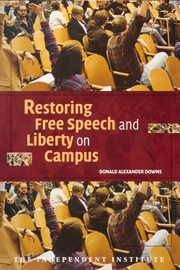An achievement of the modern feminist movement has been making society and policymakers more aware of such injustices as domestic violence and sexual assault.
This was especially needed in higher education because colleges improperly resisted acknowledging sexual crimes for far too long.
But reform movements can sometimes go awry, which appears to be the case with the Title IX regulations that now govern the handling of sexual misconduct charges on college campuses. The Trump administration should end these kangaroo court-type practices.
The situation has engendered a growing list of injustices against the accused, accompanied by a host of recently successful lawsuits as schools find themselves in what amounts to a Catch-22 predicament. This is undermining legitimate and necessary efforts to punish sex crimes on campus. No one wins in this state of affairs.
In 2011, the U.S. Department of Education began placing the heavy hand of the federal government upon the scales of campus justice in cases involving sexual misconduct, threatening to withhold federal funds if its dictates were not carried out to the letter.
This heavy-handedness was the product of administrative fiat in the form of “Dear Colleague” letters, rather than democratically accountable administrative procedures, providing a case study of how unaccountable administrative power can harm constitutional rights.
The fruit lies in the pudding. As a large group of Harvard Law School professors reported in 2014, the procedures spelled out in the Dear Colleague “guidance document” severely restricted the ability of those accused of sexual misconduct from presenting their side of the story and challenging the accusers.
Cross examination—the single most effective way to get at the truth in a challenged case—was virtually disallowed. In many cases, it became difficult for the accused to even discover all the facts relating to the charges.
In addition, schools were required to lower the standard of proof of guilt from the previously prevailing standard of “clear and convincing evidence”—such as substantial probability of guilt—to a “preponderance of the evidence” test, which means that guilt is merely more likely than not to be present.
These procedural changes too often coexist with tribunal training and campus political pressures that assume culpability, creating a de facto presumption of guilt in actual practice. In one recent case, a student was found guilty of sexual misconduct even though he was unconscious during the act, unlike his accuser.
Defenders of the new procedures often cite studies that support the claim that a “rape culture” is prevalent on campuses across the land, rendering due process a hindrance to achieving justice for victims.
But many experts have challenged these studies for including exceedingly expansive definitions of assault. Regardless, history has proved that due process rights are indispensable in order to guard against rushing to judgment and convicting the innocent.
The last thing we want is a campus sex witch-hunt reminiscent of the now widely discredited day care sex cases of the 1980s and 1990s. Unfortunately, a growing number of reasonable observers believe we have entered this forbidden territory.
Criminal law has always wrestled with the tension between the rights of the accused and the need to convict the guilty. But our constitutional order has remained committed to the principles of due process and the presumption of innocence for a simple yet profound reason: as Supreme Court Justice Robert Jackson wrote in dissent in Korematsu v. U.S. (1944), legal guilt is “individual,” not group or society based, lest we convict innocent people in the name of a higher cause or because of what others do.
Let us get at the culpable the right way. A good place to begin reform: Have campus tribunals read the seminal studies of the national “Innocence Project,” which highlight how rushes to judgment can lead to mistaken verdicts.









